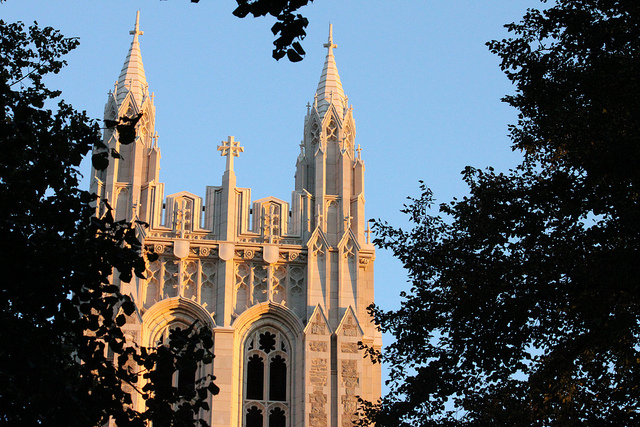
Boston College is at the center of a debate about academic freedom. (Steven Davy/ Flickr CC)
Sinn Fein leader Gerry Adams remains in an Irish prison, being questioned about the murder of a Belfast woman in 1972.
It’s widely believed that information from a Boston College oral history project that was supposed to be kept confidential helped lead to Adams's arrest. Now, some are questioning how this case will impact academic freedom and inquiry on campus.
The Boston College project called the Belfast Project included interviews with both catholics and protestants and they were to be kept secret until the parties died. But federal court orders challenged that confidentiality. Last year, the Department of Justice ordered Boston College to turn over documents and tapes from the Belfast Project, then delivered them to British authorities investigating civil unrest in Northern Ireland.
Academics across the country say the BC case is undermining oral history research on sensitive subjects.
“Very frequently the challenge for the interviewer is to get the person to speak truly and freely,” said Noah Feldman, a constitutional law professor at Harvard Law School.
Feldman says the BC project will have a chilling effect on academic expression at universities, which are often the best repositories of oral histories.
“If the person who is speaking thinks that the material may be disclosed that is going to simply undercut their capacity to speak at all,” Feldman said. “What may happen in the future is that scholars and researchers may want to hold on privately to any research that they do. That would have the perverse effect of taking research out of the hands of university libraries where it’s best protected and best funded.”
Cliff Kuhn, executive director of the Oral History Association, advises academics doing sensitive work to take precautions in advance. In the BC case, Kuhn says, researchers should have kept a distinct paper trail tracking legal and confidentiality agreements.
“People had different understandings of what was said, what was not said, what was agreed to or not agreed to at different points in the process,” Kuhn notes. “That’s really one of the problems that this particular case has experienced.”
While some have suggested the Boston College project might have a chilling effect on academic research, Kuhn isn’t convinced.
“If somebody knows in advance the possible restrictions, the possible usages of an interview that might actually involve investment on the part of the narrator in the interview itself and might actually lead to a more rich and full account,” Kuhn said.
At Boston College, administrators maintain that they did everything in their power to protect the documents and tapes.
"We hired attorneys to quash the subpoenas, and we won the only court case victory in the entire effort," said BC spokesman Jack Dunn. Ultimately, BC reluctantly released the tapes and British authorizes used them to reopen investigations into civil unrest.
“Any researcher who conducts oral history will have to take into consideration the reality that the United States has treaty obligations with many countries," Dunn said.
Today, there are no federal legal protections for colleges and universities – no matter how sensitive their research. And only Delaware has a shield law for academics.
UPDATE 5/7/14: Late Sunday, Adams was released from prison. And Boston College now says it is prepared to return tapes from its oral history project to those interviewees who feel threatened and want them back.
"We hope no one is the victim of any violence," BC's Jack Dunn tells WGBH. "The entire purpose of this archive was to try to promote peace and reconciliation in Northern Ireland."
See Greater Boston's full interview with Dunn here:










